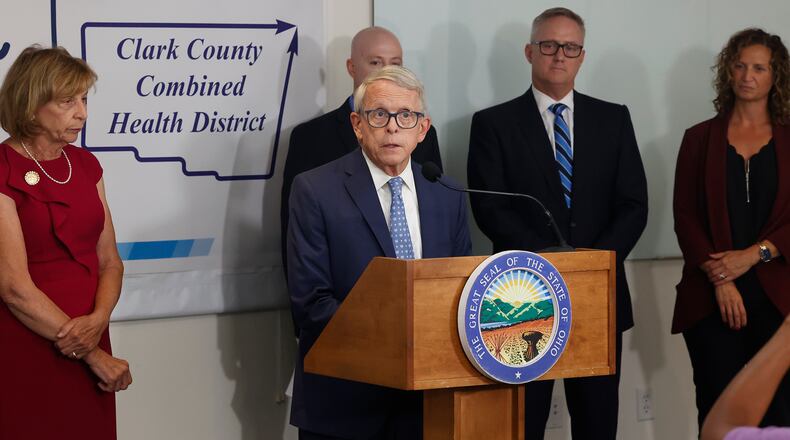These came as part of an effort to address strains caused by an influx of 12,000 to 15,000 Haitian immigrants to Springfield over the past five or so years. Springfield became a flashpoint for the national immigration debate last month after a baseless claim went viral that Haitian immigrants were eating pets. Since then, there has also been a greater focus on the impact of immigrant residents on the city.
DeWine, who has urged politicians to stop harsh rhetoric directed toward Haitian immigrants, said he feels it has been toned down some.
“What we want is a community where everybody that’s here, they feel comfortable accessing healthcare, they feel comfortable talking to the police if something has occurred where they’re a victim, so toning down the rhetoric is just important for this community,” DeWine said. “You don’t want anyone afraid and you want people to be able to live their lives. That’s in the best interest of everybody.”
The governor said it’s important to note that the state’s assistance will help all residents in Springfield.
“Every single thing we are doing to help Springfield is to help all residents. It is not helpful for any resident if they have to wait to get vaccinated, it’s not helpful to any resident if we have drivers who are not trained to drive,” DeWine said. “That’s whether it’s and 18-year-old whose family has been here forever who doesn’t take a driving course or whether it’s a Haitian who came in who’s not taking a driving course, we’re working to expand capacity there.”
The newly established mobile health clinic is seeing great success, with about 30 patient visits per day since it opened last week, DeWine said.
Work is ongoing to find a suitable location for a previously announced freestanding clinic that will “probably” have state staffing, DeWine said. He said this clinic will be around for a “significant period of time” to address needs and alleviate the long wait at the health department for an underserved community.
This effort will help Mercy Health – Springfield, which is seeing high rates of emergency room visits, by reducing the need and encouraging people to no longer use the ER for primary care, DeWine said.
“There’s always going to be emergencies where the emergency room is obviously the right place to go, but we have people who are going to the emergency room now that is not really the best place for them or for the hospital,” DeWine said. “So as we increase our services, we should see a drop in the emergency rooms, and I think that is one of the things that’s driving costs for the hospital.”
DeWine said the state is working with WIC to be more “aggressive in reaching out to people” like new mothers at Mercy Health – Springfield. He said later this month, there will be a walk-in WIC opportunity, but details are still being worked out.
“The goal is not just to clear the backlog; the whole goal is to make sure that children are getting the food that they need and the mom is healthy as well,” DeWine said. “What I think is important is that the health of one person in a community is important for the whole community, so we look at this as not just an outreach to reach Haitians; we look at this as outreach to reach anybody in the community who needs help and would qualify for that.”
While the CCCHD continues to encourage mothers to breastfeed as much as possible, DeWine said they are working with Second Harvest Food Bank to create a baby formula bank to address a national shortage and ensure all babies can be fed.
The state is also working with the CCCHD, Rocking Horse Community Health Center and Prevent Blindness Ohio to increase access to vision care and glasses, DeWine said. This effort is still in the works, he said.
Another effort in the works is assisting the CCCHD with lead abatement, a big concern for many households.
Springfield City School District’s School Based Health Center (SBHC) has been a success, DeWine said, and is helping with expanding access to primary health, being at a trusted place in the community.
DeWine said Springfield schools have not received any threats in about a week, but Ohio State Highway Patrol will continue to be on site to ensure safety, as the situation could change again.
The state is having daily conversations with federal officials to determine if Springfield can receive federal help, DeWine said.
“We’re still continuing to focus on trying to get help in here,” DeWine said.
About the Author

